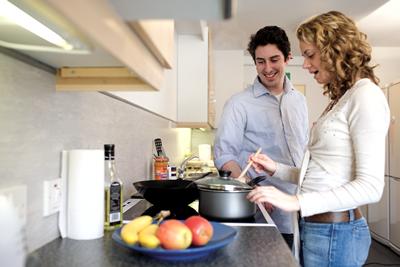Reducing food-borne infections
Southampton scientists join European collaborative: Biological Sciences postdoctoral researcher specialises in study of biofilms to contribute to international BioliSME project
Postdoctoral researcher Dr Salomé Gião is investigating ways of making our food safer. She is working on a two-year European Union-funded project to develop an effective system to sample and detect listeria monocytogenes, which can contaminate surfaces used in the food industry.
The scientist, who studied for her PhD jointly at Southampton and the University of Minho in Portugal, is working with Professor Bill Keevil at the School of Biological Sciences on the international BioliSME project. It aims to reduce the number of food-borne infections which affect thousands of vulnerable people each year and cause major public health problems throughout Europe and beyond. In particular, listeria affects pregnant women, newborn babies, elderly people and those who have problems with their immune systems. The research has been funded by the EU’s Framework Seven initiative.
The overall aim of the project is to develop a sensor to detect listeria on the surfaces of food, and other scientists in partner countries of Ireland, Spain, France, Greece and the UK are working on ways to process this information quickly and accurately. Salomé’s specific study is of biofilms, structures formed by the bacteria which they live in; how these attach to stainless steel surfaces and the hydrodynamic forces needed to detach them.
“Cells in biofilms are more resistant to biocides,” she says, “so when surface disinfection fails they may contaminate food such as dairy products, meat and vegetables. We want to find out how they behave in behave in biofilms and how strong the forces are between listeria and stainless steel surfaces”.
Always interested in environmental matters, Salomé started her academic career with an undergraduate degree in Biological Engineering with Pollution Control at Minho, and then worked in research, studying for a Masters degree at the same time.
She was inspired to come to the University of Southampton for her PhD in 2004 to work alongside Professor Keevil, after learning about his research on legionnella in drinking water. “This is another fascinating area of research,” she explains. “I hope to work in this field in future as much research remains to be done.” In 2008 she started working in the School of Biological Sciences as a postdoctoral researcher.
Outside the laboratory, Salomé is enjoying her time in Southampton, and has organised international conferences about the project. “I felt welcome at the University from the moment I arrived and I love living here,” she says.
What's related

Links to external websites
The University cannot accept responsibility for external websites.